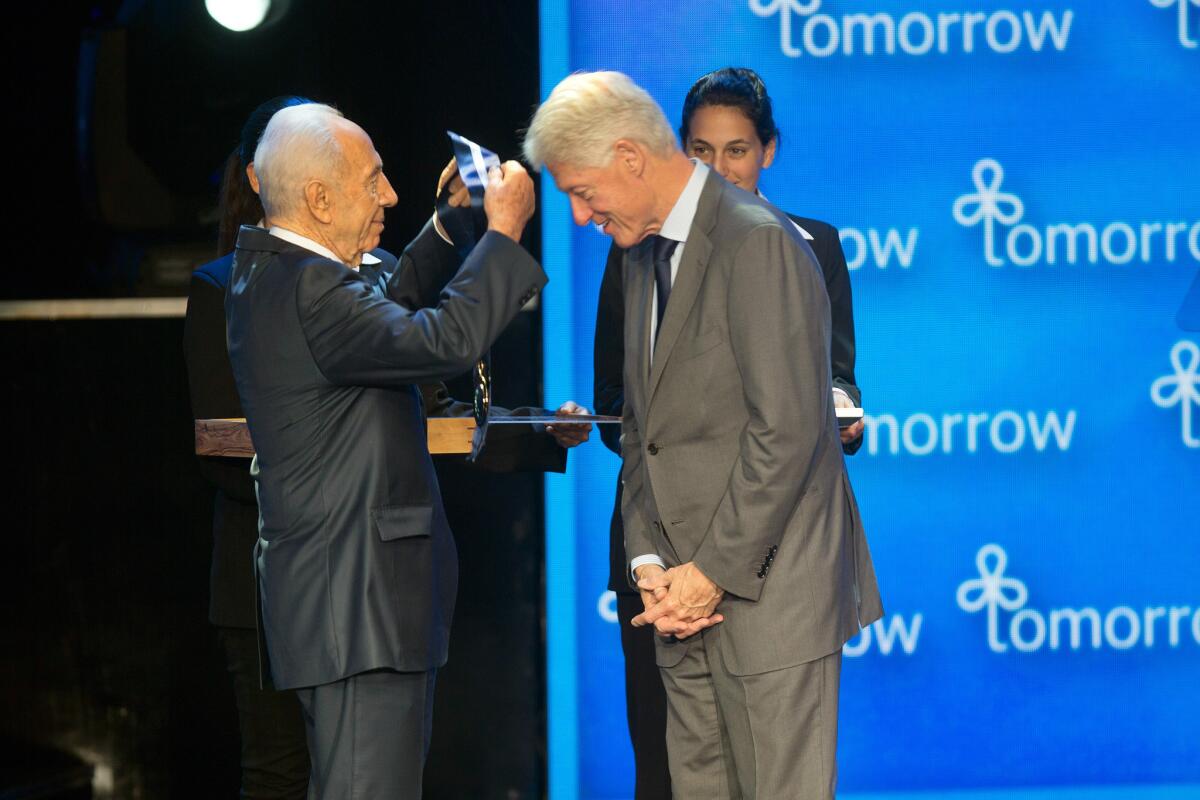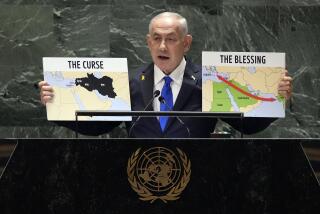No alternative to two-state solution, visiting leaders tell Israel

- Share via
JERUSALEM -- With conservative Israeli politicians increasingly dismissing the idea of a Palestinian state, the voice from international leaders gathered in Israel this week has been clear: negotiating a two-state solution is the only option.
Attending The President’s Conference, held under the auspices of Israeli President Shimon Peres, high-profile international speakers weighed in on the debate straining Prime Minister Benjamin Netanyahu’s ruling coalition.
There are no perfect solutions to the Israeli-Palestinian conflict but “no alternative to the two-state solution,” said former President Bill Clinton.
On Wednesday, Peres awarded Clinton the presidential Medal of Freedom, Israel’s highest distinction, for his friendship and work the Israeli president said laid the foundations that would “one day bring peace to our region.”
In a possible reference to Israeli Economy Minister Naftali Bennett, who said this week that a two-state solution was “a dead end,” Middle East Quartet envoy Tony Blair said “the fantasy is thinking one state is sustainable or consistent with Israeli values.”
The two-state solution is not a fantasy, but the window of opportunity for negotiating it is short and could close “maybe forever,” Blair said.
Adding his voice to the mix was Chicago Mayor Rahm Emanuel, President Obama’s former chief of staff, saying there is “too much focus on the process of peace” and not enough on its benefits.
Secretary of State John F. Kerry has been trying to renew Israeli-Palestinian talks since taking office in February. Kerry is expected to make his fifth visit to the region as secretary next week.
Netanyahu and Palestinian President Mahmoud Abbas, in separate meetings with European Union foreign policy chief Catherine Ashton, said they supported Kerry’s peace efforts, although the formula for getting the parties back to the negotiating table has not yet been found.
Netanyahu told Ashton on Thursday that Israel was willing to resume talks without preconditions “today, yesterday and tomorrow.” Netanyahu has said recently that the negotiated agreement should be “based on a demilitarized Palestinian state that recognizes the Jewish Israel” and solid security arrangements.
Abbas reiterated to Ashton that talks should lead to the end of Israel’s military occupation in the West Bank and the establishment a Palestinian state.
If Kerry’s work has not yet revived talks, it has helped calm the situation in the West Bank, according to a senior Israeli military commander. Briefing foreign diplomats and media this week, Maj. Gen. Nitzan Alon said the efforts have had a “positive influence on the ground” and that the Palestinian Authority was aiding these moves.
But Nitzan also observed the beginning of an increase in stone-throwing and fire-bombs attacks, and cautioned that if American attempts were for naught, “we will see this trend of escalation even strengthening.”
Nitzan’s comments drew an angry response from hawkish Israeli politicians, including Deputy Foreign Minister Zeev Elkin, who told Israeli radio that if the army thinks security in the West Bank will deteriorate, it needs to “prepare for this and deal with it.”
Elkin also referred to comments made by Meir Dagan, former head of Israel’s Mossad who also spoke at the conference. Dagan argued that Israel should make peace first with the Arab world and then with the Palestinians and that while the Arab peace initiative was not all great, it was a starting point. He also said that Israel could defend itself from the borders that existed before the 1967 Middle East War. Israel seized the West Bank, the Golan Heights and the Sinai Desert during that campaign, later returning control of the Sinai to Egypt.
Israeli security officials sometimes express “enthusiastic support of things that ultimately provide less security for Israeli citizens,” not more, Elkin said.
ALSO:
Young revelers inject new life into Iran’s capital
Egypt’s Morsi sparks anger with Islamist picks for top posts
Global Voices: An immigrant’s uphill push for a greener Greece
More to Read
Sign up for Essential California
The most important California stories and recommendations in your inbox every morning.
You may occasionally receive promotional content from the Los Angeles Times.










